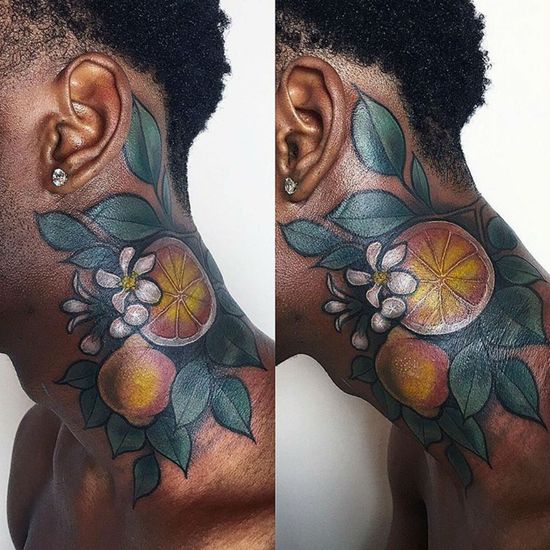
Tattooing has become increasingly popular in Nigeria in recent years, particularly among the younger generation. However, tattoos are still somewhat taboo in Nigerian society, and many people hold negative views of those who have them.
In some parts of Nigeria, tattoos are associated with criminal gangs and are seen as a symbol of lawlessness and anti-social behaviour. As a result, many people with tattoos may face discrimination in certain social and professional settings. In spite of this, it has not stopped those who like it to have tattoo inscription on their bodies.
Tattoo have become part of fashion in the country. It is an in-thing for those in the entertainment industry in order to have a sence of belonging with the movers and shakers of the industry. Though, people used to look at those with tattoo on their body as belonging to gang, but things are changing and those with tattoos are increasingly receiving acceptance in the larger society.
Despite this, there are many tattoo studios and artists in Nigeria, particularly in the larger cities such as Lagos, Abuja and Port Harcourt. Some of these artists specialize in traditional African designs, while others offer modern and Western-style tattoos.
Health Risks Associated With Tattoo
It is worth noting that there are some health risks associated with getting a tattoo, such as infection and allergic reactions. It is important to take proper care of your tattoo and follow the artist’s aftercare instructions to minimize these risks.
Getting a tattoo involves piercing the skin with a needle and injecting ink into the dermis layer of the skin. As with any invasive procedure, there are some potential health risks associated with getting a tattoo. Some of the most common risks include:
Infection
If the equipment used to create the tattoo is not properly sterilized, bacteria and other microorganisms can be introduced into the skin, leading to infection. Signs of infection include redness, swelling, and pain around the tattooed area, as well as fever and chills.
Allergic reactions
Some people may have an allergic reaction to the ink used in their tattoo. This can lead to symptoms such as itching, redness, and swelling around the tattooed area. In severe cases, an allergic reaction can cause difficulty breathing and other life-threatening symptoms.
Skin problems
Tattoos can cause a variety of skin problems, including scarring, keloid formation, and granulomas (small bumps that form around the tattooed area).
Bloodborne diseases
If the equipment used to create the tattoo is not properly sterilized, it can transmit bloodborne diseases such as hepatitis B and C, HIV, and tetanus.
To minimize the risk of these and other health problems associated with getting a tattoo, it is important to choose a reputable tattoo artist who uses sterile equipment and follows proper hygiene procedures. It is also important to take good care of your tattoo after it has been created, following the artist’s aftercare instructions carefully to minimize the risk of infection and other complications.
Though, some may perceive those with tattoo on their body as being irresponsible, but things are changing and those with such inscriptions on their body are increasingly receiving acceptance in the larger society.
What do you think about the implications of piercing your body in the name of tattoo?
Let me hear your thoughts in the comments section right now.





















